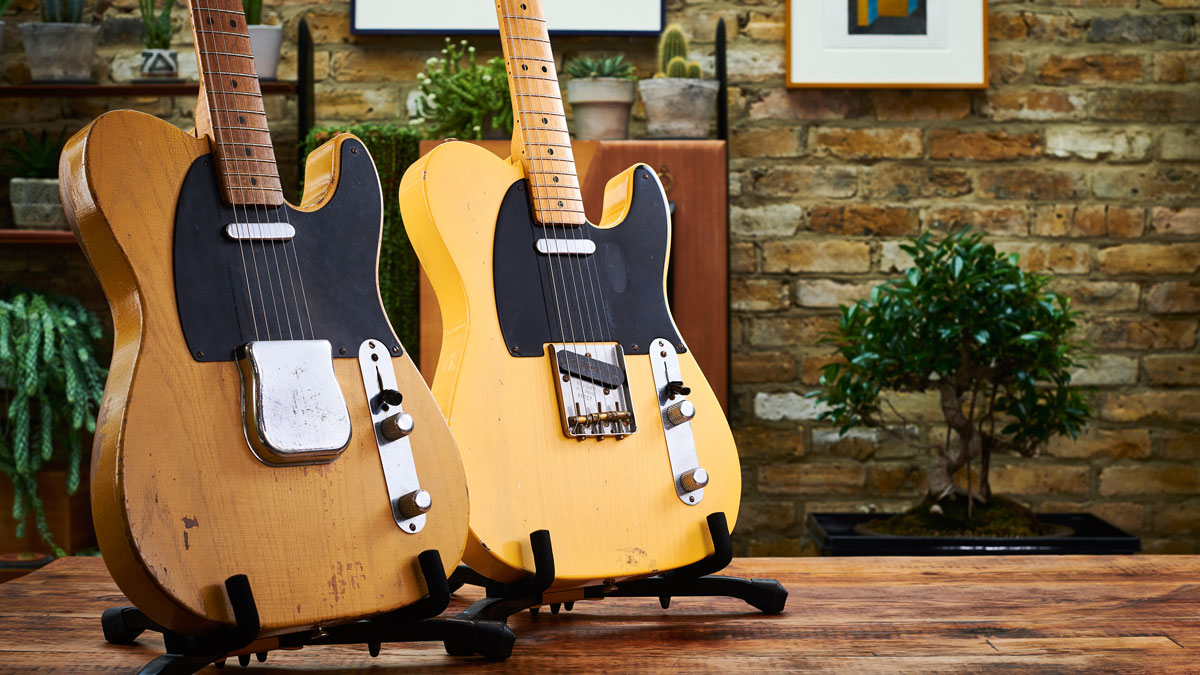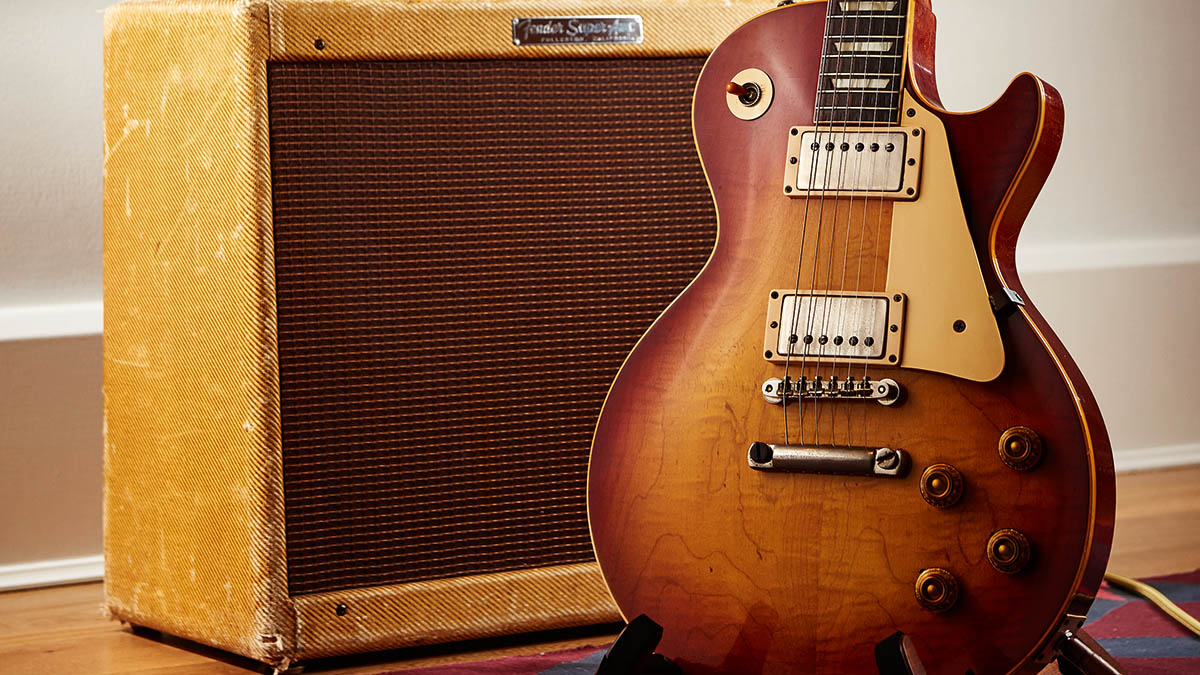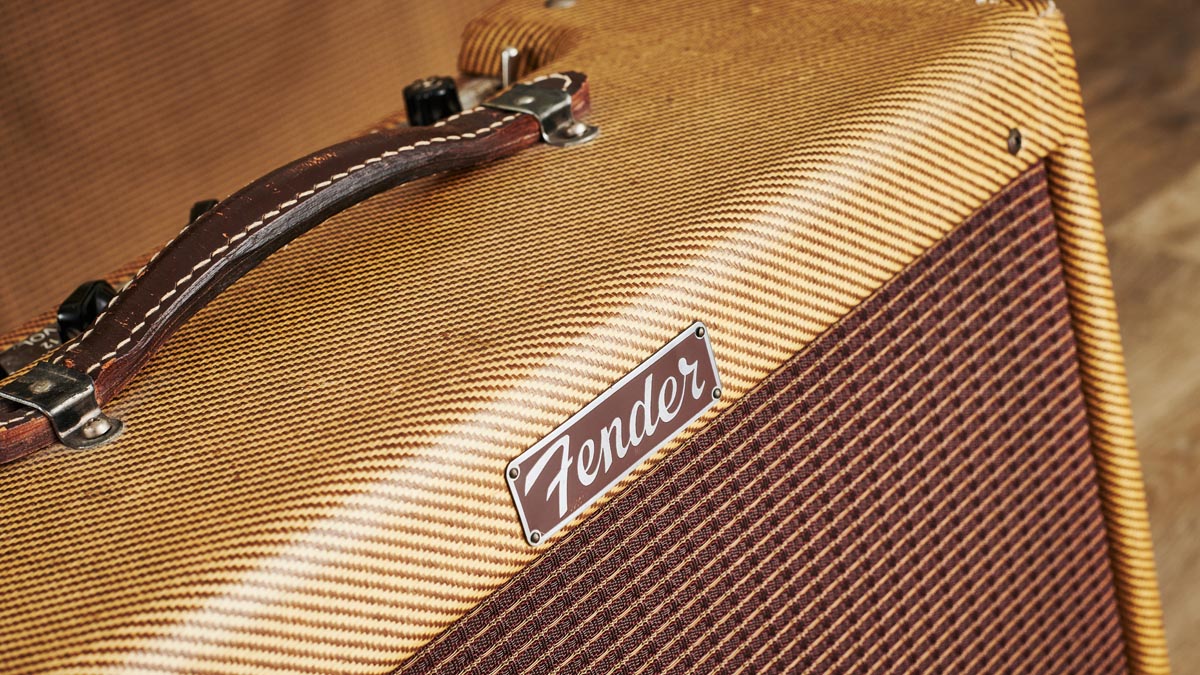Gear Acquisition Syndrome: is it real, are you suffering from it, and what can be done to help gear addiction?
GW checks in with experts and self-proclaimed gear addicts to find out if G.A.S. exists or is simply a figment of our imagination

Gear Acquisition Syndrome – or G.A.S. for short – is a term that describes the seemingly uncontrollable impulse to buy – you guessed it – gear.
It’s that insatiable rush that invades every cell in your being, convincing you that you need to buy that guitar. That you need to buy that pedal, or if you’ve got the real estate to back it up, the half stacks, full stacks and all the guitar amps and combos you can get your hands on.
But why? How did this start? And what triggers it? Is it a bad thing? Is it a good thing? And is it even a “thing” at all?
We did some research to clear the air and dispel the myths surrounding this fascinating phenomenon plaguing seasoned guitarists and unsuspecting newbies alike.
And then there was G.A.S.
Originally called Guitar Acquisition Syndrome, the term’s origins trace back to Steely Dan guitarist Walter Becker, who introduced the term in a 1996 Guitar Player magazine article titled “G.A.S.,” humorously urging guitarists to become aware of its existence, and the case-queen compound or fuzz-pedal fort one will inevitably find themselves surrounded by (or buried under, depending on the severity) if not addressed.
“Guitar Acquisition Syndrome. You undoubtedly know someone who has it. Reading this rag, you probably have it yourself. Or will have it someday soon or would like to have it. You may think it’s cool. But it’s not cool. Not anymore. How many Strats do you need to be happy? How many Strat copies, each extensively modified to be able to produce the variations in tone that once would have required maybe four different guitars? How many knobs and switches does that Strat need?” Becker wrote.
As other non-guitar-playing musicians experiencing the same impulses caught wind of guitar acquisition syndrome, and as guitarists realized that the extent of their urge went beyond the guitar itself, the term evolved to be more inclusive, turning into gear acquisition syndrome, opening the joyous floodgates to all things guitar- and musical-instrument related – whether that be bass guitars, interfaces, pedals, amps, etc.
All the latest guitar news, interviews, lessons, reviews, deals and more, direct to your inbox!
The properties of G.A.S.
How does one know if he or she has G.A.S.? And is it something you suffer from, or something to embrace?
Similar to the actual gaseous state of matter, G.A.S. starts off invisible and can completely fill up all the accessible space made available to it; it creeps up on you moving at an extremely fast pace; and it’s compressible and expandable. But thankfully, to our salvation, it’s not deadly, and it doesn’t smell… but it can attack you.
In his comical and tongue-in-cheek book GAS! Living with Guitar Acquisition Syndrome, author Jay Wright compiles confessions from hundreds of gassers (a word we made up to refer to those of us with G.A.S.) around the world. One of them describes a G.A.S. attack in detail.

“G.A.S. can strike you at any time, but onset normally occurs upon seeing, hearing or touching a particular axe. The attack itself can range from mild to severe. Your eyes open wider as the pupils dilate; your breathing becomes more noticeable as your heart rate increases. You drool, you stare, you drool some more… Your mind races as you imagine the rest of your life with this baby in it – how much more skilled, happy and fulfilled you would be.
“Then you begin to imagine how incomplete and unfulfilled the rest of your life would be without it. A battle erupts inside you: heart vs. head. You’re faced with two immediate problems: 1) how to find relief from this powerful force, and 2) how to manage a transfer of ownership. That, my friend, is a G.A.S. attack.”
As self-proclaimed gassers, we can attest to the veracity of such attacks, becoming enraptured at the sight of a guitar – let alone hundreds. We have experienced walking into a music store and becoming entranced, feeling breathless, overly stimulated and admittedly, salivating. Yes, the drool is real, and it is also involuntary.
Other symptoms we’ve experienced range from restless bouts of excitable anticipation to predatory-like pursuits of the desired possession. The euphoria culminates only with the explosive yet serene comfort brought forth the moment you receive and hold your prized object… only for the quest to start all over again once you discover your next prey.
If you nodded in agreement to the aforementioned symptoms; congratulations – you passed G.A.S. It’s a sport. You win some, you lose some. But if not managed properly, can you lose yourself in the process, too?
And the question remains… is this a real phenomenon, or a playful acronym the tight-knit gear community uses to conceal our indulgent spending habits?
Here comes the trigger; your G.A.S. just got bigger
One of the greatest underlying questions when researching G.A.S. is, what sets it off? What triggers the notion that you must have that new piece of gear when you already have one – or 100?
San Diego-based Jan Hoeglund, a 39-year-old guitarist and owner of Audio Imperia, said his trigger stems from a deep-seated emotional connection coupled with the satisfaction he receives from the pursuit of the instrument at hand.
“I collect from the guitarists that shaped my playing as I was progressing from my journey,” Hoeglund says. “I always ask myself what an instrument means to me personally versus how much it’s worth. And there’s the element of the hunt for incredibly hard-to-find guitars. Finding and purchasing them is extraordinarily satisfying.”
I have an emotional connection with singlecut Les Paul guitars because I was obsessed with Slash... so my first electric guitar had to be a Les Paul
Jan Hoeglund, owner, Audio Imperia
Hoeglund added that his G.A.S. is particularly triggered by certain artist signature models – a collecting approach inspired by his first time listening to Slash.
“I have an emotional connection with singlecut Les Paul guitars because I was obsessed with Slash when I listened to him as a child, so my first electric guitar had to be a Les Paul,” Hoeglund says. “Seeing those models took me back to that precise moment in time when I first heard Slash.”

The emotional bond is a common motive for those amassing gear, but 65-year-old Murrieta, California-based collector Mark Nalley says his purchases also have to be financially sound.
“My guitar collection has got sentimental value to it because I’m emotionally connected to it, but it’s also like having money in the bank,” Nalley says. “Emotions are a trigger, but the finances of it are really pinnacle. You can be emotional about whatever you want, but you have to separate emotion if the financial investment doesn’t make sense.”
You get caught up in it, stuck in the minutiae of tubes, amps, tone, thinking you’ll sound just like Albert Lee if you make that tweak
Jethro Odom
For Jethro Odom, a 53-year-old guitarist and healthcare executive in Seattle, his trigger is attributed to the endless permutations in the quest for tone.
“I have to know what something sounds like with different pickup combinations,” Odom says. “And then I have to know what it’ll sound like with a particular amp. You over-intellectualize things to maybe give yourself the excuse to buy it.”
He also discussed how the friendly G.A.S.-perpetuating gear community contributes to supporting his endeavors.
“There’s a whole aspect of being online with people who are passionate about a sub-genre of gear,” Odom says. “And then you get caught up in it, stuck in the minutiae of tubes, amps, tone, thinking you’ll sound just like Albert Lee if you make that tweak. You can always convince yourself, but usually, I think it’s a pursuit of knowledge and tone.”
Filling a void, or fueling our creativity?
Anyone with G.A.S. has or will inevitably be faced with the daunting question, “But why do you need another one if you’ve already got plenty of them?” coming – usually – from a significant other or from anyone attempting to dwell in the same abode as you and your extended guitar family.
You may have even been accused of having a problem or an addiction. But if G.A.S. does in fact exist, do we resort to it to fill a void, or to ignite our creative pursuits?
Dr. Joel J. Heidelbaugh, an avid guitarist, medical doctor and clinical professor at the Departments of Family Medicine and Urology at the University of Michigan Medical School in Ann Arbor, offers an optimistic outlook.

“If you’re like me, you’re trying to fill your house,” Heidelbaugh says with a laugh. “Guitarists are usually trying to fill the need for diversity and fill the need for different styles, different tones, different elements. If you were to ask somebody what their favorite band is, very few people are going to give you one answer; they’re going to give you multiple answers.
“To put it in context for non-musicians, nobody is going to get away with just sneakers or just dress shoes. And more than filling a void, I believe it’s trying to fill a desire for an element of completeness in a passion that you’re following, and that passion is music. The greatest thing about G.A.S. is that it can spawn creativity for people and keep them loving music. I’m a firm believer that music can enrich your life, and I also think it’s a great health benefit.”
Dr. T.M. Robinson-Mosley, a sport mental health expert and counseling psychologist based out of Atlanta, said G.A.S. leans toward the positive if it’s purpose-focused.
“Being able to engage in practices connected to music is very powerful because they can be driven by passion, purpose and community,” Mosley says.
“This is an area where music and sports are similar in that you see people coming together. But if you are engaging in something that pulls you away from community, or pulls you away from being able to really enjoy the beauty that comes from this creative endeavor, then you kind of defeat the purpose of why you’re having G.A.S. in the first place.”
A Method to Your G.A.S.ness
How do you go about it? Is it collecting? Is it G.A.S.? Is it hoarding? Or is it all three? Oh my.
In their 2021 book Gear Acquisition Syndrome: Consumption of Instruments and Technology in Popular Music, authors Jan-Peter Herbst and Jonas Menze elucidate on the notion of collecting versus gassing. They explain that there is overlap between collecting and gassing, but that one is more methodical than the other.
“G.A.S. has compulsive features, while collecting has a rational and strategic side, whether for the sake of social capital, cultural heritage or transcendence. However, collectors’ emotional reactions and motivations make it problematic to consider the spectrum of rationality as the main distinguishing factor between G.A.S. and collecting.
“Both exhibit additional commonalities that show in information-seeking activities, excitement in the ‘hunt,’ flow states and satisfaction and relief in the event of success,” Herbst and Menze say.
Josh Scott, Kansas City, Missouri-based owner and creator of JHS Pedals and host of The JHS Show on YouTube, has a jaw-dropping collection exceeding 5,000 pedals, independent from his company’s inventory. His collection is so cosmic, it is now a museum in the making.
He recalled the moment he realized he became a collector, at one point humorously questioning if he was hoarder. He’s far from it, but how did he make that distinction?
“My assistant Katrina kept putting shelves on the wall, and the shelving kept growing, and growing, and growing. And I’d say, ‘Oh, we’re done.’ And then I’d say, ‘I need a few more.’ And it became a joke. It never ended,” Scott says. “Once the room reached shelving from floor to ceiling, 360 degrees, I asked Katrina if she thought I was hoarding, but she said, ‘No, you’re too organized. You’re a collector.’”
Because Scott is a passionate storyteller fueled by sharing his gift and knowledge with others, we, too, agree he does not fall under the category of hoarder, but rather a connoisseur, collector and curator heavily invested in documenting guitar history and the artifacts that go with it.
“I’m a historian in the study of the evolution of electronics of guitar, so my goal is to own every piece of development,” Scott says. “My approach is similar to a library or museum.”
So how to know if you’re teetering between G.A.S. or hoarding?
“With hoarding there is typically an intense attachment to an object because it is often rooted in trauma,” Mosley says. “It usually stems from something catastrophic that has happened, and parting with objects is extremely painful and difficult.”
In Gear Acquisition Syndrome: Consumption of Instruments and Technology in Popular Music, authors Herbst and Menze cite Peter Subkowski’s 2006 book On the Psychodynamics of Collecting, explaining the difference.
“Collecting, by contrast, is defined as a methodical pursuit with an attempt at completion and an above-average interest in a topic, which is accompanied by the reading of literature and other information-seeking activities, and it is carried out passionately and becoming persistent over time (Subkowski 2006).”
G.A.S., too, shall pass?
While it appears there is no cure for this fascinating phenomenon (nor do we wish to eradicate it), there are certainly ways to mitigate and perfect it.
If you suspect you do have G.A.S., seasoned gassers recommend setting parameters to prevent a potentially dangerous leak. What those strategies are can only be decided by you, based on your interests and income.
Hoeglund suggests you earn before you burn – and to develop a system.
“G.A.S. was only a problem when I didn’t have the money, but never to the point where it got in the way of my obligations,” he said. “If you buy it, you should be able to afford it at least twice. My focus is that I am a completionist. I collect three of each guitar I buy – one to keep, one to potentially sell and another to potentially trade.”

For Odom, his niche is Fender’s high-gain amps. Nalley, who owns many of Eddie Van Halen’s personal and coveted guitars, forgoes manufactured memorabilia and only focuses on high-value guitars that were owned and played by guitarists he has an emotional tie to.
Brett Coleman, a 52-year-old guitar player and oil industry executive in Houston, with a collection of more than 300 guitars, is passionate about shredder-era guitar music, and his impressive collection reflects that. He suggests you identify your passion, and G.A.S. accordingly.
Figure out your lane. If you’re all about vintage gear, learn as much as you can about vintage instruments. If you want to be a shred collector, then learn as much as you can about that era
Brett Coleman
“Figure out your lane. If you’re all about vintage gear, learn as much as you can about vintage instruments. If you want to be a shred collector, then learn as much as you can about that era,” Coleman says. “Don’t buy one or two of these, and one or two of those, because then you’ll be all over the place.”
As to how to prevent a leak, Coleman says to keep your priorities in check and to not rack up your debt.
“Take care of your family first. Don’t sacrifice the light bill or your kid’s Little League,” Coleman says. “Also, don’t charge up your credit cards; otherwise you’ll become what I call a credit card collector.”
To mitigate G.A.S., Mosley provides a handy acronym to put under your belt at the onset of symptoms.
“When you talk about triggers, it’s good for people to be aware of H.A.L.T. and identify when they are Hungry, Angry or Anxious, Lonely or Tired,” Mosley says. “Those spaces can often trigger folks to compulsively buy things to binge on, and we become especially vulnerable.”
When things get G.A.S.tronomical
How much is too many? Is your collection so vast that your spiritual flagpole is at half-mast? Is your collection guilt- or nausea-inducing instead of pleasure producing? Or do you relish in walking down memory lane as you proudly stare at your hard-earned collection?
Proverbial memes say if you know how many guitars you have, you don’t have enough. Coleman says the right number is a pair and a spare, and more technical opinions say the equation is n+1, with n being the number of guitars you currently possess, meaning your quest is always infinite and your G.A.S. is ever-expanding (did we not say earlier that it expands and contracts?).
We found out, however, that the answer is that only you can determine what the magic number is. There is no one size to fit all. There’s only what works for you and those impacted by your disposition for gear acquisition, if any.
If you believe your urge is out of balance, though, Mosley provides another handy acronym.
“When we think about whether something is becoming a problem, it’s more than just the actual behavior, it’s what’s impacted by the behavior,” Mosley says. “The acronym I pull from is F.I.T., which stands for Frequency, Intensity and Time. Are you noticing the frequency increasing, buying gear every day, every week or every month?
“Are your urges more intense, where you can’t shake them off and you must scratch that itch? Is this happening for extended periods? It’s important to remember this isn’t happening in a vacuum, so if G.A.S. moves into a place that is unhelpful or unhealthy, you might want to assess.”
So, G.A.S. – myth or fact?
Our conclusion is that G.A.S. is an indisputable fact, and it is only something to reflect on if your impulses leave you in absolute shambles or financial ruins, in complete isolation, and if you are severely neglecting other aspects of your life that leave you desolate, destitute and in a state of starvation, whether physical or spiritual.
Otherwise, who are we to judge? We are fellow proud gassers. If in balance, G.A.S. is a state of sheer bliss in the pursuit of tonal pleasure that manifests in the tangible world in the shape of a guitar, a pedal, an amp or whatever music-making muse sparks your fire.
The G in G.A.S. stands for gear – not guilt. So go forth, G.A.S. responsibly in the name of music. Because it’s not something you suffer from when you enjoy it, right?
- Disclaimer: The information in this article is not intended or implied to be a substitute for medical advice, diagnosis or treatment. If you suspect you have G.A.S., visit your nearest music shop or favorite gear site for immediate assistance.
A classically trained guitarist with a soft spot for metal, Pauline France is synonymous with all things writing, guitar and public relations – she is Guitar & PR. Her career in M.I. spans more than 15 years, working in Fender Musical Instruments Corporation’s communications departments, as well as being a Fender Play Instructor and on-camera personality for Fender Premium Audio.






